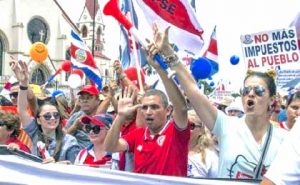
No More Taxes on the People
October 14— The Costa Rican masses have taken to the streets by the thousands for two weeks. They are protesting the agreement that President Carlos Alvarado intended to make with the International Monetary Fund (IMF). The $1.75 billion loan was supposedly to alleviate the capitalist economic crisis that Costa Rica was already going through, which the Covid19 pandemic has deepened, intensified and made more devastating.
The masses are protesting because they know that IMF loans mean tax increases, privatization of vital public services, and criminal budget cuts. Even though the government announced that it had withdrawn its petition to the IMF, blockades of ports and roads, and massive confrontations with the riot police, continue.
“The problem is the banks,” said one worker. Like him, many of the protesters in the streets have shown aspects of knowing that their fight is actually against capitalism. The solution they are looking for, through class instinct, is communist revolution and building a communist society on the rubble of capitalism.
But they will not hear this nor will they be led towards this goal by the heads of the “National Rescue Movement” that is leading the protests. One is Célimo Guido Cruz, a former deputy for a now defunct socialist political party. Another is José Miguel Corrales, a former presidential candidate and former deputy for the National Liberation Party, the older of the two traditional bourgeois parties.
It is the duty and honor of our comrades in Central America to bring to the Costa Rican working masses the message that the only solution is to mobilize for communism. That we and they need to join and organize the International Communist Workers’ Party.
Our goal is to put an end to capitalism-imperialism and establish communism all over the world. In communism there will be no money, markets, banks, wages, or wage slavery. Collectively we will produce and share everything we need according to the principle: From each according to their ability and commitment, to each according to their need.
This is our future: where workers’ lives will be more valuable than anything else – especially during pandemics and natural disasters.

